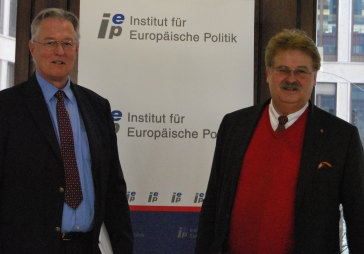IEP Lunch Debate with Elmar Brok: “The European Union facing new challenges: transatlantic free trade, intensified neighbourhood policy, joint crisis intervention”

Elmar Brok, MEP and Chair of the European Parliament Committee on Foreign Affairs, gave an address on “The European Union facing new challenges: transatlantic free trade, intensified neighbourhood policy, joint crisis intervention” on 15 April 2013 at the Representation of the European Commission in Berlin. Prof. Dr. Mathias Jopp, director of the Institut für Europäische Politik, moderated the event.
On April 15, 2013, Elmar Brok, Member of the European Parliament and Chairman of the Committee of Foreign Affairs of the European Parliament, gave a presentation for an audience of approx. 200 participants on the planned Transatlantic Free Trade Agreement, the intensified Neighbourhood Policy and the EU crisis intervention. He highlighted the importance of national governments placing a stronger emphasis on the positive aspects of the EU, both with regard to the EU’s external relations and to the inner crisis of the EU. With the new tools for coping with the eurozone crisis and the new budgetary und supervisory procedures, more substantial results have been achieved on the EU level than on the federal level in the German political system. It is extremely important to bring these developments to public attention. With regard to the current efforts in Cyprus, Brok emphasized that all Member States of the EU are of equal value. Thus, it is of utmost importance to support Cyprus; by no means can the EU refuse to rescue a Member State that is facing difficulties simply because it is economically insignificant. This would lead to increasing mistrust between the Member States and endanger the EU’s internal market.
Regarding the project of a Transatlantic Free Trade Area, Brok pointed out that the EU currently has the biggest share of global GDP with 27–28 per cent. The EU is also in a better position than Japan and the U.S. in terms of national deficit. Thus, the EU can enter negotiations about a transatlantic agreement with confidence. Brok emphasized the importance to start with the negotiations immediately following the report of the High Level Group this summer, although they can be expected to be complicated, especially in the fields of norms and standards as well as agriculture. The effects of tariff-barriers alone account for 10 per cent of the common transatlantic trade, which could be completely removed. A Transatlantic Free Trade Agreement would mean an additional annual growth of 0.5 per cent and an absolute increase in EU GDP of 86 billion Euro. Furthermore, the economic area created by the agreement would encompass 800 billion consumers, produce almost half of the global GDP and support the creation of urgently needed employment.
Brok took a rather critical stance towards the European Neighbourhood Policy, which is not working properly. In the Eastern Dimension, the Member States tend to completely underestimate the competition of Russia over integration, whose imperialist efforts are starting to have an impact. It is hardly possible to talk about democratic reform in the Eastern Partnership countries, and the past decade can be considered wasted time in this regard.
The negotiated Association Agreement with Ukraine is an important component for the future development of this country’s relations with the EU. At the same time, however, it will only be possible to sign and ratify the agreement if Kiev is not simultaneously responding to the Russian offer of a free trade area. Free trade in both directions is mutually exclusive. In the southern dimension, there is significant change happening in the Arab countries. In this regard, the national reflexes of the EU Member States are problematic and prevent a truly common approach. Brok rejected suggestions to transfer the competences for the European Neighbourhood Policy completely to the High Representative and emphasized that areas already displaying a relatively high degree of communitisation should not to be completely re-intergovernmentalized.
On the other hand, Brok firmly emphasized the necessity of a European External Action Service. This service is still in an early stage of development, and there are still tensions with the European Commission. Furthermore, the discussions of the PSK-ambassadors are too lengthy, and the decision-making process suffers from the principle of unanimity. However, Brok believes in the success of the External Action Service in the long run. In no other country worldwide, he argued, has a foreign service been successfully developed in such a short period of time. Thus, he called for awaiting the review of the External Action Service, its procedures and instruments as well as the review of the Common Foreign and Defense Policy in order to give the development of a European Foreign and Security Policy a chance.
Regarding the EU crisis intervention and the Common Security and Defence Policy, Brok regretted that the Intensified Cooperation and the Permanent Structured Cooperation have so far not been put to use. The French intervention in Mali was important and legitimate and so was the support by the other EU Member States, including Germany. However, the fact that the EU training mission in Mali was already agreed upon last autumn but realized only now is a negative development. Actually, the EU is particularly skilled and experienced in the formation and training of local law enforcement and peace-keeping forces. In Somalia, the training mission EUTM is running successfully, and the same can be said for the Atlanta Mission fighting against piracy off the coast of Somalia.
On the whole, Brok emphasised that it is important to reinvigorate the development of the EU external relations, which in recent years have been neglected in favor of the creation of consolidation instruments and fiscal reforms in the fight against the eurozone crisis. A global re-shuffling will take place in the next two to five years, a development which is not pausing for Europe, even though there are great expectations for the EU on the part of the U.S. and other countries and regions such as ASEAN.
By Anna Wartmann
